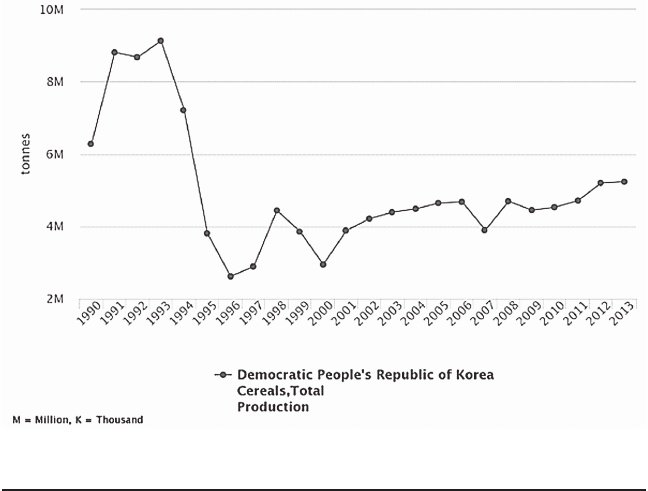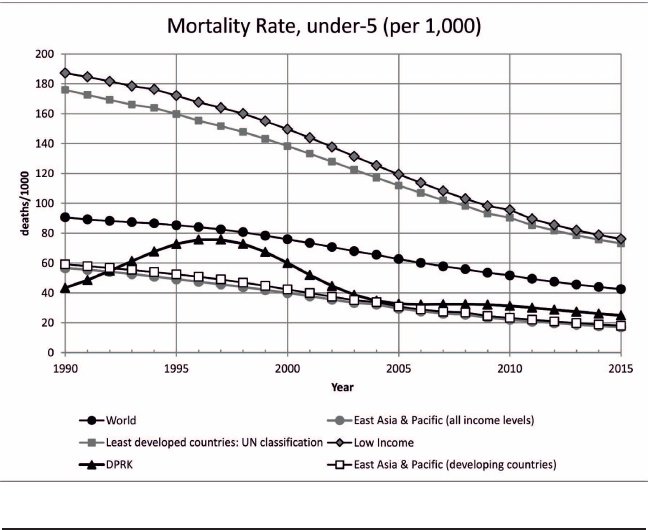"DPRK starves their people" is a very popular meme among Western imperialists, but far too often when pressed on their understanding of the situation of food security in DPRK, it is revealed that, well, they lack any such basis in the first place. So, here& #39;s a thread on it. 1/
In order to understand the inherent struggles with food security in DPRK, it is necessary to understand the fact that DPRK& #39;s land is nowhere near ideal for agricultural production. Its arable land makes up only 17% of total landmass and volatile weather often forms substantial 2/
complications. The lack of ideal agricultural resources is among the largest causes for the major famine in the 1990s. However, it is also the case that the decision to close itself off to the world (with the exception of cases such as the USSR) exacerbated the problem. 3/
Hence, the combination of the repeated floods and droughts with the collapse of the USSR created a shock that proved to be disastrous for DPRK. But what& #39;s interesting about this was the response of DPRK: it opened up and became less isolationist. This decision runs absolutely 4/
counter to the narrative that the DPRK government actively seeks to starve its own population. Furthermore, popular discourse surrounding the topic is often contradictory and self defeating. It is claimed that the command economy is fundamentally inefficient and the government 5/
controlling it chooses to let its people starve. But the latter implies that there is enough food available, and that the government simply deliberately withholds it. Thus, according to Western propaganda, DPRK both does and doesn& #39;t have enough food to feed its population. 6/
In that case, which claim is true? As stated previously, DPRK has made active strides to improve their food security. This has had tangible results; for example, severe wasting by the mid 2010s was lower that other low-income countries and equal to major developing EA nations 7/
Furthermore, Cereal production, which is an important metric of indication of how well a country can stave off famine, has been steadily increasing since the 1990s famine. 8/
Infant and child mortality have decreased to the point where they are comparable to the major developing East Asian countries. Furthermore stunting (low height for age), previously among the highest in the world, has also decreased to being close to the World average. 9/
So the question becomes then, what challenges does DPRK face today, and what role does the government play in addressing them? Currently, improvement in food security is somewhat stunted primarily by foreign military threats and sanctions. 10/
As previously stated, foreign imports have shown to be crucial for DPRK food security because of a low availability of arable land and poor climate, both issues that persist today. Hence, sanctions hinder the food availability for the average person, in more ways than one. 11/
Contrary to popular belief, most DPRK citizens do not get their food exclusively from government sources. Roughly 60% of citizens obtain food from informal markets (장마당). Naturally, this requires money. However, with economic sanctions levied against DPRK, these citizens 12/
have had their ability to obtain income (from activities such as fishing) impeded. As it has been noted even among bourgeois media, these sanctions do nothing to hinder the government& #39;s pursuit of nuclear weapons, but they do actively harm the country& #39;s citizens. 13/
With that being said, would there potentially be greater food availability where the government to cease its nuclear arms pursuits and focus solely on food security? Sure. But to assume that this would translate to more food for the population would be to assume that 14/
the US government has any intention of ceasing its pursuit of a regime change in DPRK. Sanctions will continue. Military grandstanding near the boarder of and surrounding DPRK will continue. And ultimately, this reality exemplifies the inherent contradiction in the Western 15/
obsession with DPRK& #39;s food security. As we speak, the US government actively seeks to reduce food security for its own citizens in reductions to SNAP. The US does not guarantee healthcare as a right. These are decisions that result in the material suffering and deaths 16/
of millions. Meanwhile, it spends hundreds of thousands of billions on its military. This point does not exist to engage in "Whataboutism." This point exists to demonstrate the fundamental material differences between an imperialist nation and an oppressed nation. 17/
The US has no one to fear in terms of military. It could eliminate 80% of its military overnight and there would still be no tangible foreign military threat. The DPRK faces an existential threat via the United States every second of every day. With this put into perspective, 18/
the chauvinist and demagogic nature of the question of, "Why does DPRK spend money on its military instead of helping it& #39;s people?" becomes clear. Furthermore, it exposes the fundamental contradiction in feigning concern for the average DPRK citizen while simultaneously 19/
claiming that the country should cease nuclear arms pursuits. Food security depends on these pursuits. The existence of a nuclear deterrent allows for breathing room and enables DPRK to pursue improvements to their food security without fear. The insistence by Westerners that 20/
the bloated US military is justified in the face of poor social mobility, healthcare, food security, etc. and a lack of a tangible militaristic threat, while the DPRK& #39;s military is not justified, is orientalist and absolutely racist. 21/

 Read on Twitter
Read on Twitter






